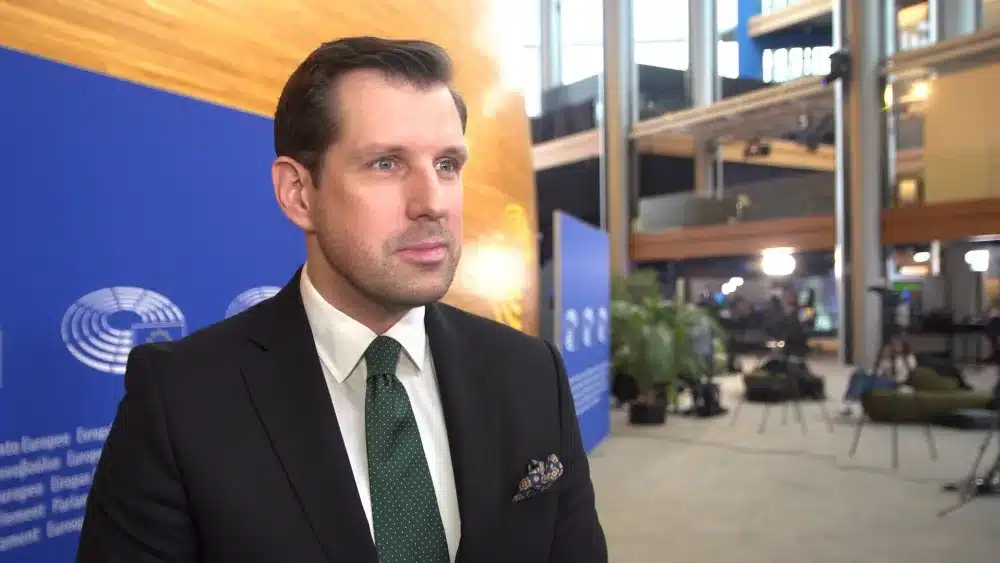On October 9th, in the European Parliament, MEPs along with Hungarian Prime Minister Viktor Orbán discussed the priorities of Hungary’s EU Council Presidency, which began on July 1st and will end at the close of the year. Some speakers criticized the Hungarian Prime Minister, primarily for questioning Ukraine’s fight against Russian aggression, collaborating with the regime in Moscow, and diverging from European values. Others praised the Hungarian government for its stance on migration and placing competitiveness at the top of its agenda. According to MEP Tobiasz Bocheński from the Law and Justice party, the debate turned into a tribunal over Hungary.
“Hungary, taking over the presidency, presented a vision of how Europe should look in their view: a Europe of nations, one focused on the migration issue and shutting down illegal immigration. Orbán outlined many points of this policy in the European Parliament,” Bocheński told Newseria Biznes. “What’s frustrating is that both von der Leyen, as the head of the Commission, attacked Hungary, and the debate turned into a massive tribunal questioning whether it was good or bad that Orbán is the Prime Minister. Right and left-wing MEPs attacked and interrupted each other, while Orbán responded. This is not what the European Parliament is for. We were supposed to discuss the direction of the presidency, but that didn’t really happen.”
In his speech to the European Parliament, Viktor Orbán emphasized that the EU must change in light of new threats such as the war in Ukraine, escalating conflicts in the Middle East and Africa, migration, and the loss of Europe’s global competitiveness. According to him, competitiveness is the key issue, as the EU’s economic growth over the past two decades has been significantly lower than that of China and the US, and the EU’s share in global trade has decreased. The Hungarian Prime Minister pointed out that, due to the shift away from Russian energy sources, the EU has lost significant GDP growth, while decarbonization has led to a slowdown in productivity and job losses.
The Hungarian presidency’s program focuses on strengthening the EU’s competitiveness, defense policy, and cohesion, tackling illegal migration, addressing demographic challenges, and improving the situation of farmers. Early in Hungary’s presidency, Orbán visited Ukraine, Russia, where he met with Vladimir Putin, and China, which drew criticism in Brussels. The conflict between Budapest and EU institutions, Hungary’s practice of vetoing initiatives, and its questioning of EU policies on issues such as support for Ukraine’s accession and its stance on Russia and China have led to calls to strip Hungary of its presidency.
“The accusations against Hungary for undermining European values are, in my view, very questionable because, of the 720 of us here in Parliament, apart from Hungarian MPs and a few others interested in Hungarian affairs, most have no clue about what’s going on, and rely only on media reports or their colleagues,” Bocheński argues. “We have no information that electoral procedures are being violated. The government is democratic, ruling through parliament, with a separation of powers in place. This is an attempt by socialists and centrist politicians to interfere in Hungary’s affairs simply because they don’t like the government. We saw this with Poland, and now with Italy. It’s purely political, not a matter of values.”
Orbán also received support for his stance on migration and prioritizing competitiveness. Some MEPs praised Hungary as a defender of traditional values and used the opportunity to argue that green transformation policies and burdensome EU regulations are destroying Europe’s economy.
On January 1, 2025, Warsaw will take over the presidency from Budapest, marking Poland’s second presidency of the EU Council. At a meeting with entrepreneurs in May, Magdalena Sobkowiak-Czarnecka, Undersecretary of State in the Chancellery of the Prime Minister responsible for EU affairs, outlined Poland’s presidency priorities as supporting sustainable development, digitalizing the economy, strengthening cooperation within the EU single market, and promoting equality. Entrepreneurs, represented by the Lewiatan Confederation, highlighted other important areas, such as ensuring drug security, creating a European industrial framework, supporting SMEs in their transformation, and addressing overregulation at the EU level.
“The priorities of Poland’s presidency, which are being formulated under the leadership of President Andrzej Duda, Prime Minister Donald Tusk, and Foreign Minister Sikorski, are of great importance. All debates and discussions in the EU show that we, as a community, are facing crises—economic, migration, and, of course, the war in Ukraine,” said Bocheński. “Thus, Poland’s agenda should be acceptable to most European countries while also focusing on issues that are critical for us. For Poland, these are, without a doubt, military security and economic security, ensuring that we continue to grow and avoid a major economic crisis.”
